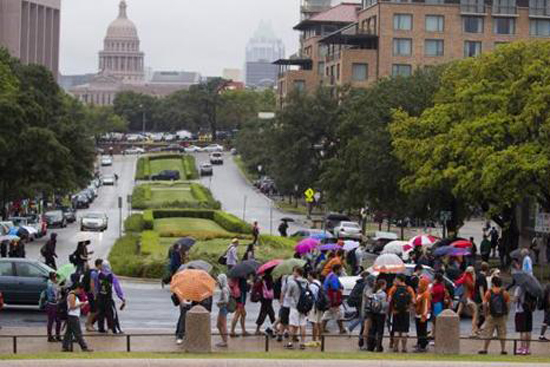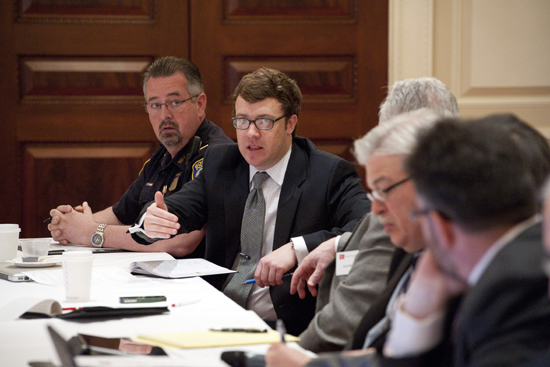Handling Campus Bomb Threats
What BU would do

University of Texas, Austin, students had to evacuate buildings on campus September 14. Thousands of people streamed off university campuses in Texas and North Dakota after phoned-in bomb threats prompted evacuations and officials warned students and faculty to get away as quickly as possible. No bombs were found on either campus by early afternoon, and it was not clear whether the threats were related. AP Photo/Statesman.com, Ricardo B. Brazziell
The bomb threats against the MATCH School near BU earlier this month—as well as a spate of recent threats against universities nationally—prompt an observation from Boston University Police Chief Thomas Robbins: bomb threats typically involve more threat than bomb.
In the majority of cases, “an individual or group whose intention is to inflict mass destruction on a community will not provide a prior warning,” says Robbins. Obviously, however, police can’t take chances, and the BUPD assisted during the MATCH emergency, helping evacuate the public high school and maintain crowd control (the school’s students spent an hour and a half at Walter Brown Arena before police determined there was no bomb and let them return). Meanwhile, Boston police have come to campus at least twice in recent years to examine suspicious packages before declaring them bomb-free, says Robbins.
Given those scares, and the recent threats at the University of Texas, Austin, North Dakota State University, Hiram College in Ohio, and Louisiana State University, what’s the BU protocol?
“Each situation is different and must be addressed based on the circumstances,” says Stephen Morash, the University’s director of emergency response planning. Morash, who was an emergency management deputy for Boston before coming to BU, worked at Logan Airport in the week after planes from there were hijacked and used in the 9/11 attacks. He oversees mock disaster rehearsals each year with BU officials, most recently a fictional campus shooting last spring.

Robbins says police consider several factors when dealing with a bomb threat, including whether it’s a threat alone or involves a suspicious package, how the threat was received (“phone call to police? call to person or location?”), and the specificity of the threat. “Since the validity of a bomb threat cannot be determined initially,” he says, “the decision to evacuate the threatened premises is the responsibility of a manager or owner of the premises” before police and firefighters arrive. Once they’re on site, the question of whether or not to evacuate is usually decided in consultation with them.
During the MATCH emergency, the BU Alert system emailed a notice and sent an automated phone message to the University community about the threats, advising people to avoid the Commonwealth Avenue and Babcock Street area near the charter school.
The police can order an evacuation at any time, and if a package or potential bomb is involved, the BUPD requests Boston police to send their technicians and bomb-detecting dogs, Robbins says.
In a nightmare scenario—a bomb detonating—the University would activate what officials practiced in Morash’s fictional drill last spring: a command center of high-ranking BU officials coordinating University actions in the aftermath of the disaster. Spring’s center involved dozens of participants from BU, Boston and MBTA police, and emergency medical services, led by Peter Fiedler (COM’77), the University’s vice president for administrative services. Sitting around a horseshoe of banquet tables in the Metcalf Trustee Ballroom, the officials practiced making the kind of real-life decisions they would face in an actual emergency, from finding housing for displaced students to warning away campus visitors to determining whether and where students could gather for counseling and whether to hold classes in the days immediately following the emergency.
A key takeaway for students and staff in a crisis is to check BU’s website and online media, where bulletins—alerting the community about which parts of campus might be closed, which employees should stay home, the end of an incident, and other announcements—would be a priority for the command team.
Federal emergency management guidelines require such coordinated responses by private and government agencies, Robbins says, which means that his department and Morash will continue to organize such drills.
Comments & Discussion
Boston University moderates comments to facilitate an informed, substantive, civil conversation. Abusive, profane, self-promotional, misleading, incoherent or off-topic comments will be rejected. Moderators are staffed during regular business hours (EST) and can only accept comments written in English. Statistics or facts must include a citation or a link to the citation.